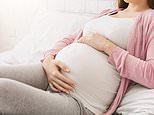Breathing in a level of air pollution common in the UK could increase the risk of male infertility by 25 per cent, a study warns.
The analysis by Danish researchers also found women exposed to traffic noise levels common in England led to a 14 per cent increased risk of infertility.
British experts say the findings are limited, but if confirmed could have 'profound effects on future generations'.
Their findings are based on national study of over 500,000 men and nearly 400,000 women aged between 30 and 45 with fewer than two children, who were living in Denmark between 2000 and 2017.
Experts analysed their reproductive health and looked for patterns with long-running data on the air and noise pollution at their address.


For air pollution they specifically looked at PM2.5 which means tiny material less 2.5 micrometres in diameter created by road traffic and burning of fossil fuels in urban settings.
They found Danish men exposed to an annual average of 2.9 micrograms of fine particles of pollution per cubic metre, had a 24 per cent increased risk of infertility.
Worryingly, the latest data shows the annual average level of PM2.5 in UK cities is nearly double this figure.
However, this can rise to numbers as high as 10 in places like Brighton.
While the Danish researchers didn't observe a similar impact of PM2.5 exposure on women's fertility they did see a similar affect from noise pollution.
Noise pollution refers to excess levels of sound from things like road traffic and has been linked to a reduced of sleep and increased stress with knock-on effects to cardiovascular health and mental health conditions.
Exposure to 10.2 decibel higher than average levels of road traffic was linked to a 14 per cent increased risk of infertility among women older than 35.

The average level of noise pollution over the course of the study women were exposed to was between 57.7 and 59.1 decibels.
For context, about 40 per cent of the adult population is estimated to be exposed to long term traffic noise exceeding 50 decibels though this rises to 80 per cent in some areas.
Noise wasn't associated with a rise of infertility among younger women, but was linked to a 'small' rise in infertility in older men, those aged 37 to 45.
Researchers found these results were consistent for Danes living both rural and urban areas, and occurred regardless of if people were rich or poor.
The research, published in the BMJ, is observational meaning it cannot directly establish that pollution causes infertility.
It was also limited by only analysing pollution data recorded at person's address and not that any fumes they may have been exposed to at work or during leisure activities like exercising.
Additionally, data on known factors that can influence fertility such as lifestyle factors was lacking.
The authors of the study, who hailed from a variety of Danish institutions, said if their findings are replicated by other scientists they could help create strategies and policies to protect the population from noise and air pollution.
Some British experts have hailed the study, stating while limited by its observational nature, represents an important piece of research that deserves attention.
Professor Jill Belch, an expert in vascular medicine and air pollution from the University of Dundee said: 'This is a key study linking even more toxic effects to exposure to air pollution in particular to the very small particles PM2.5'.
'Childlessness can be catastrophic for some, and it is likely that the known harmful effects on sperm quality and movement are at play here. More attention needs to be paid to achieving legal limits of air pollution by Government and Local Authorities.'
She added: 'If validated by future prospective work then this association has striking implications for fertility as a 24 per cent fall in male fertility and a 14 per cent in female fertility would have very profound effects on future generations.'
Other experts said, while a good study the findings were limited by its very nature.
Professor Allan Pacey, an expert in andrology at the University of Manchester said: 'It is possible that the real cause of this association lies with something that it was not possible to measure.
'For example, the authors are clear that they did not have information on lifestyle factors, such as alcohol use, smoking, or body mass index.
“However, overall, I think this is a good study and it should serve as useful basis for future investigations in other countries that are able to link their databases like this.'
Professor Alison Campbell, an expert in fertility at the University of Kent added: 'The study’s findings come amid a decline in birth rates in many countries, over the past decade.
'Whilst some people elect not to have children for a broad number of reasons, infertility is a health problem that contributes to these statistics.'
But she urged people trying to conceive not to be put off by the findings.
'People trying to conceive should not be unduly concerned by this research and are advised to take proactive, proven steps such as avoiding smoking, limiting alcohol consumption, and maintaining a healthy weight, and consulting a medical specialist for further help and advice,' he said.


About one in seven couples in the UK have difficulty conceiving, rising to one in six globally, and one in five in the US.
Known causes of infertility include genetic issues, health conditions or hormonal problems or exposure to some treatments, such as chemotherapy.
But in about a quarter of cases no cause for infertility can be found, according to the NHS.
Some studies have also pointed to a rise in obesity and exposure to chemicals and pollution as another possibly factor.
Infertility, as well as people not having children by choice, has spooked some experts, and famous figures like Elon Musk, to warn the world faces an underpopulation crisis.
This 'underpopulation crisis' could see too few younger people to work, pay tax and look after the elderly.
Office for National Statistics data shows the fertility rate — the average number of children a woman has — in England and Wales slumped to 1.49 in 2022.
It marks the lowest figure since records began in 1938, laying bare the reality of the ongoing baby bust that threatens to cripple the economy.
Not a single one of the 330-plus authorities in both countries has a fertility rate that is above 'replacement level', according to MailOnline analysis.
Other studies have also pointed to declining sperm counts in men as a potential factor, though some experts dispute this.












